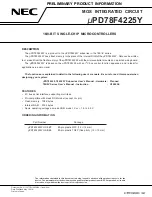READI Module
MPC561/MPC563 Reference Manual, Rev. 1.2
Freescale Semiconductor
24-21
24.7.1
Functional Description
The READI signal interface provides the function of transmitting messages from the message queues to
the external tools. The signal interface also provides the control for timing and logic for formatting the
messages.
24.7.1.1
Signals Implemented
The READI module implements one MCKO, MCKI, EVTI, RSTI, MSEO, and MSEI signal. It also
implements one or two MDI and two or eight MDO signals. The input signals are synchronized to the
MCKI input clock and the output signals are synchronized to the free running MCKO output clock. The
MCKI input clock should be synchronised to the MCKO ouput clock to ensure correct message reception.
The READI signal definition is outlined in
NOTE
MCKI clock frequency has to be less than or equal to one half of MCKO
clock frequency.
Table 24-17. Description of READI Signals
IEEE-ISTO
5001 Signal
Name
Input/
Output
Description of Signal
MCKO
Output
Message Clock-Out (MCKO) is a free-running output clock to development tools for timing of
MDO and MSEO signal functions. MCKO is the same as the MCU system clock.
MDO[7:0] or
MDO[1:0]
Output
Message Data Out (MDO[7:0] or MDO[1:0]) are output signals used for uploading OTM, BTM,
DTM, and Read/Write Accesses. External latching of MDO will occur on rising edge of MCKO.
Eight signals are implemented. MDO[7:0] are used in full port mode, MDO[1:0] are used in
reduced port mode.
MSEO
Output
Message Start/End Out (MSEO) is an output signal which indicates when a message on the
MDO signals has started, when a variable length packet has ended, and when the message
has ended. 1 MSEO signal is implemented. External latching of MSEO will occur on rising
edge of MCKO.
MCKI
Input
Message Clock-In (MCKI) is a input clock from development tools for timing of MDI and MSEI
signal functions. MCKI frequency has to be less than or equal to one half of MCKO frequency.
MDI[1:0]
or
MDI0
Input
Message Data In (MDI[1:0] or MDI[0]) are input signals used for downloading configuration
information, writes to user resources, etc. Internal latching of MDI will occur on rising edge of
MCKI. Two signals are implemented on the MPC561/MPC563. MDI[1:0] are used in full port
mode, MDI[0] only is used in reduced port mode.
MSEI
Input
Message Start/End In (MSEI) is an input signal which indicates when a message on the MDI
signals has started, when a variable length packet has ended, and when the message has
ended. 1 MSEI signal is implemented. Internal latching of MSEI will occur on rising edge of
MCKI.
EVTI
Input
Event In (EVTI) — The EVTI signal is level sensitive when configured for breakpoint
generation, otherwise it is edge sensitive.
RSTI
Input
Reset In (RSTI).
Summary of Contents for MPC561
Page 84: ...MPC561 MPC563 Reference Manual Rev 1 2 lxxxiv Freescale Semiconductor...
Page 144: ...Signal Descriptions MPC561 MPC563 Reference Manual Rev 1 2 2 46 Freescale Semiconductor...
Page 206: ...Central Processing Unit MPC561 MPC563 Reference Manual Rev 1 2 3 62 Freescale Semiconductor...
Page 302: ...Reset MPC561 MPC563 Reference Manual Rev 1 2 7 14 Freescale Semiconductor...
Page 854: ...Time Processor Unit 3 MPC561 MPC563 Reference Manual Rev 1 2 19 24 Freescale Semiconductor...
Page 968: ...Development Support MPC561 MPC563 Reference Manual Rev 1 2 23 54 Freescale Semiconductor...
Page 1144: ...Internal Memory Map MPC561 MPC563 Reference Manual Rev 1 2 B 34 Freescale Semiconductor...
Page 1212: ...TPU3 ROM Functions MPC561 MPC563 Reference Manual Rev 1 2 D 60 Freescale Semiconductor...
Page 1216: ...Memory Access Timing MPC561 MPC563 Reference Manual Rev 1 2 E 4 Freescale Semiconductor...


















